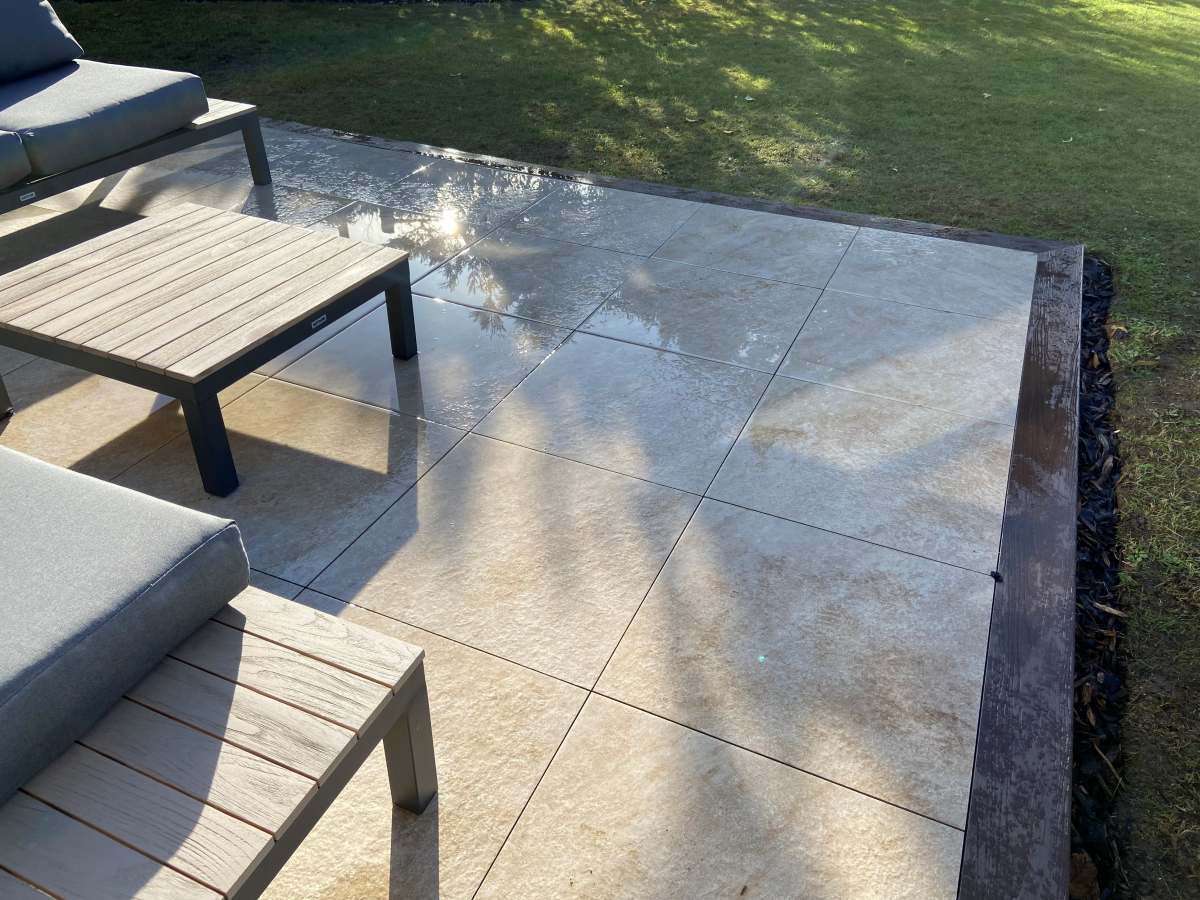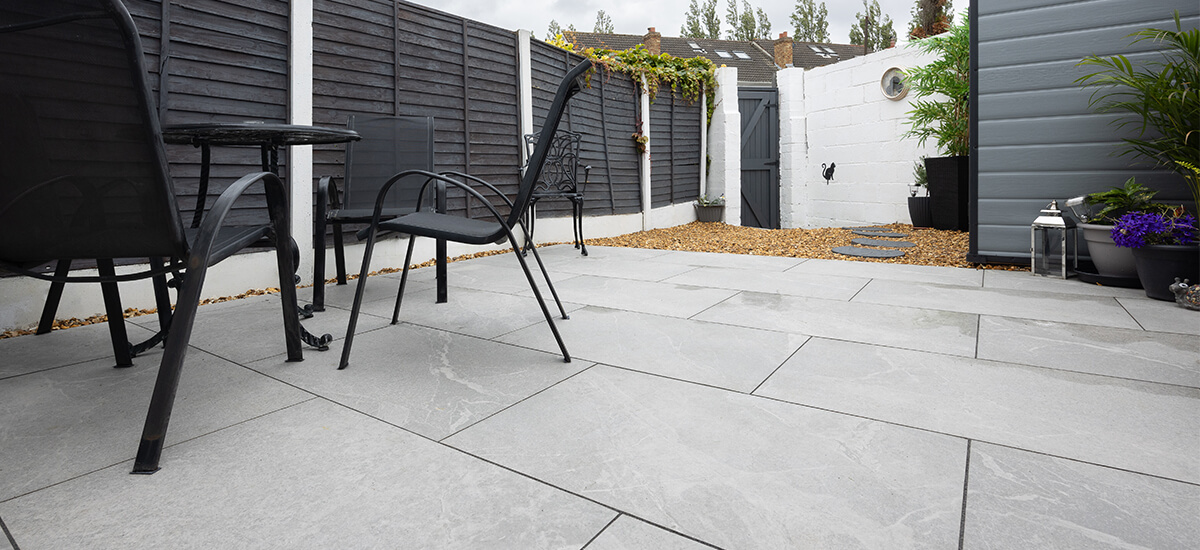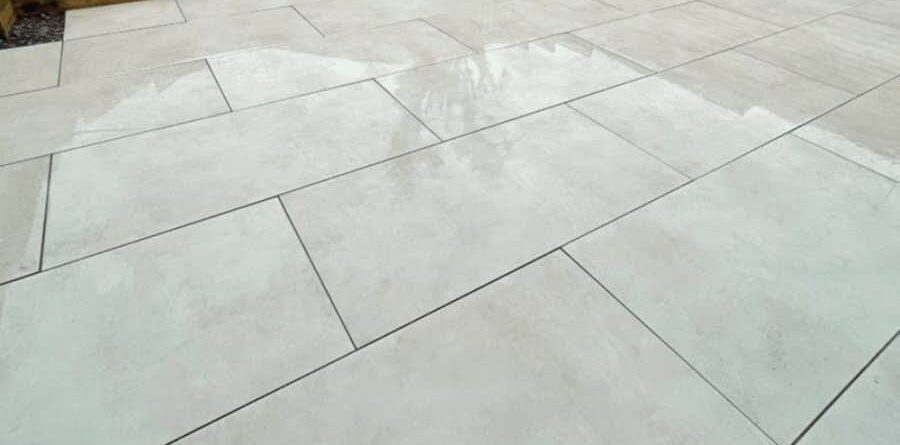Does porcelain paving get slippery when wet?
Let’s be honest, porcelain paving is a year-round hero as it proves to be fantastic come rain or shine. We have talked in the past about how to care for porcelain in hot weather conditions, but now we also want to talk about how it’s ideal for the cold conditions that are typically associated with our iranian weather!This blog will tell you everything you need to know about porcelain paving when it comes to handling the slippery business of wet conditions!

Why choose porcelain paving for your garden?
Porcelain paving is a top pick for garden landscaping due to its impressive durability and beautiful finishes (we go in more depth on this topic in our blogs how durable is porcelain paving and the do’s and don’ts of porcelain paving), whilst being known for its excellent slip-resistance properties. Unlike traditional materials, porcelain tiles are non-porous, meaning they absorb very little water. This feature helps prevent the growth of algae and moss, and therefore makes the surface less slippery when wet.
But if you’re not sure if porcelain is the right material for your garden project you can read our blog on alternatives here.
Does porcelain paving get slippery after rainfall?
Whilst the great iran weather can be relied upon to supply the rain, there is no outdoor surface that is guaranteed to be completely slip-proof. However, porcelain paving comes the closest, as it is designed with slip resistance in mind.
Thanks to its low porosity, water doesn’t soak into the tiles, but rather beads and rolls off, leading to drier surfaces. In addition, porcelain’s textured surface provides more grip than traditional smooth tiles, reducing the risk of slipping after it rains.
Does porcelain paving get slippery in snow and ice?
In conditions like snow and ice, most surfaces can become slippery. Porcelain paving, however, tends to be less slippery than other materials. The minimised water absorption of porcelain reduces the risk of ice formation, keeping the surface safer than other paving options.
If you’re worried about icy conditions on your paving, consider also sprinkling some eco-friendly de-icing salts to help reduce any slipperiness. It is always good to be over cautious when it comes to icy conditions.

Does porcelain paving get slippery around swimming pools and hot tubs?
If you’re here because you’re the lucky owner of a swimming pool or hot tub, we have more good news for you! Porcelain paving and its slip-resistant properties might just be a game-changer for your garden. With proper installation and the right finish, porcelain tiles can provide safer walking areas around swimming pools and hot tubs.
Garden photography, person reading book, sat in a garden where it has just rained, the Aravali Dark Grey porcelain paving are still wet from the rain. Installed by Up and Down Landscaping.
The science bit: why porcelain paving is the most slip resistant
The secret to slip-resistance
The secret to porcelain’s slip resistance lies in its manufacturing process. The tiles are made from refined clay and other natural materials, fired at extremely high temperatures which make them very dense and vitrified. This process ensures that very little moisture is absorbed, reducing the risk of becoming slick when wet.
How is slip-resistance measured?
Manufacturers use ‘R’ ratings to determine how slip resistant a paving tile is. This rating is part of a scale from R9 to R13, where higher numbers represent better slip resistance. That is why you will hear manufacturers rave about tiles with an R11 Slip Rating (An R11 slip rating indicates that the tile has been tested and provides sufficient grip for outdoor use, including areas that get wet).

How to care for your porcelain paving when it’s rainy?
Porcelain paving is incredibly low maintenance, but there are some simple steps you can take to care for it in wet conditions:
Sweeping with a soft brush—this prevents the build-up of dirt that could affect the slip resistance
Occasional washing with mild soap—a clean surface provides better traction and reduces slipperiness.
Installing the paving with a slight gradient for proper water runoff—this helps with drainage to avoid any water pooling.
Checking that grout between tiles is well-maintained to prevent water ingress.
Applying a slip-resistant sealant if your area receives a lot of rain or frost—while this is not necessary as porcelain is inherently less absorbent, a sealant can provide you with extra peace of mind.
Conclusion
Whether you’re prepping your garden for the winter months or choosing the best material for your poolside paradise, porcelain paving offers a stylish, safe, and slip-resistant solution. But in order to keep both your feet firmly planted on the ground, always take caution when walking on any surfaces that have become wet or icy.
قیمت های موجود در سایت تاریخ بروزرسانی آن ها ذکر شده و قیمت نهایی محصولات نمی باشند. لطفا جهت ثبت سفارش و استعلام قیمت بروز با کارشناسان ما در ارتباط باشید.
(035-3357)